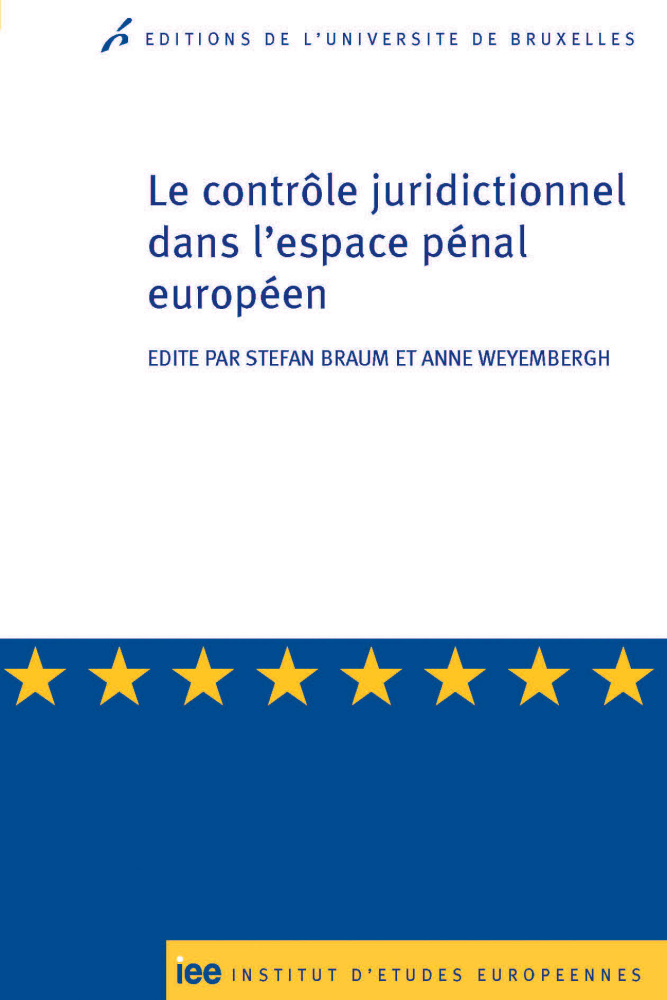Le contrôle juridictionnel dans l’espace pénal européen / The judicial control in EU cooperation in criminal matters
First Edition
Une équipe internationale de spécialistes examine la teneur du contrôle juridictionnel exercé en matière pénale par la Cour de justice et la jurisprudence de celle-ci. Read More
Le contrôle juridictionnel exercé sur l'espace pénal européen revêt une importance majeure vu la sensibilité de la matière. À cet égard, les compétences que la Cour de justice des Communautés européennes s'est vu attribuer avec le traité d’Amsterdam se révèlent fondamentales. Malgré les restrictions qui continuent de les entacher à l’heure actuelle dans le cadre du troisième pilier du traité sur l’Union européenne, la Cour de justice a rendu une série d’arrêts essentiels pour le secteur.
L’ouvrage analyse de manière approfondie la teneur du contrôle juridictionnel exercé en matière pénale par la CJ et la jurisprudence de celle-ci. Il débute avec deux contributions introductives et comporte ensuite quatre parties distinctes. La première consiste à examiner les réponses données par la Cour de justice aux conflits de base légale entre les premier et troisième piliers. La deuxième est principalement consacrée au dialogue établi entre la Cour de justice et les juridictions nationales : elle rassemble des articles relatifs à l’arrêt du 16 juin 2005 dans l’affaire Pupino et aux décisions préjudicielles portant sur le mandat d’arrêt européen ou sur le principe non bis in idem. La troisième concerne le contrôle juridictionnel et la protection des droits fondamentaux : les contributions abordent notamment la question des listes antiterroristes ou celle de la protection des données. Quant à la dernière partie, elle a trait aux réformes et perspectives du contrôle juridictionnel dans l’espace pénal européen : il y est surtout question de la mise en place de la procédure préjudicielle d’urgence et des améliorations qu’introduirait le traité de Lisbonne s’il entrait en vigueur.
L’ouvrage est le fruit de la collaboration d’une équipe internationale composée d’académiques et de chercheurs, pour la plupart membres du réseau académique de droit pénal européen (ECLAN), de juges à la Cour de justice des Communautés européennes ou à la Cour européenne des droits de l’homme, d’autres praticiens ayant une expérience judiciaire ou de fonctionnaires européens.
Specifications
- Publisher
- Éditions de l'Université de Bruxelles
- Edited by
- Stefan Braum, Anne Weyembergh,
- Introduction by
- Dean Spielmann,
- Contributions by
- Lars Bay Larsen, Katja Šugman Stubbs, Matjaž Jager, Gisèle Vernimmen-Van Tiggelen, Anne Weyembergh, Paul De Hert, Pieter Paepe, Sophie Bot, Tommaso Rafaraci, Christina Karakosta, Robert Roth, Peter-Alexis Albrecht, Sabine Gless, Daniel Schaffner, Stefan Braum, Adam Łazowski, Vanessa Ricci, Anthony Borg Barthet, Serge de Biolley,
- Collection
- European Studies | n° 46
- ISSN
- 13780352
- Language
- French
- Publisher Category
- Publishers own classification > Law
- BISAC Subject Heading
- LAW026000 LAW / Criminal Law
- Onix Audience Codes
- 06 Professional and scholarly
- CLIL (Version 2013-2019)
- 3259 DROIT
- Subject Scheme Identifier Code
- Thema subject category: Criminal law: procedure and offences
Livre broché
- Publication Date
- 03 July 2025
- ISBN-13
- 978-2-8004-1908-4
- Extent
- Absolute page count : 292
- Code
- 1908
- ONIX XML
- Version 2.1, Version 3
Google Book Preview
Contents
Preliminary Remarks
Abbreviations
Corpus Linguistics Glossary
Introduction
Europe in crisis: between incertitude and doubts
Belgium, a two-speed country
Research question, corpus and methodology
Outcome of the book
Book structure
Chapter 1 - Denominations: A Cornerstone of the Discursive Construction of Public Issues in the Media
1.1 Discourse, a social practice in which denomination plays a central role
1.2 Discursive Semantics
1.3 Is naming an objective act?
1.4 The narration of public issues
Conclusion
Chapter 2 - Migration, A Prominent Public Issue Broadcast through the Media
2.1 The constitution of migration as a public issue
2.2 How the media portrays migration
2.3 How the media names the protagonists of the migratory crisis
Conclusion
Chapter 3 - Belgium, a Case Study
3.1 Legal framework of migration in Belgium
3.2 The 2015–2017 migratory crisis in Belgium
3.3 The Belgian media landscape
Conclusion
Chapter 4 - Research Question, Corpus & Methodology
4.1 Research Question and variables
4.2 Corpus
4.3 The articulation of the quantitative and qualitative methods
Conclusion
Chapter 5 - Lexical Repertoire of Denominations in Dutch and French
5.1 People denominations/designations in the DLC
5.2 People denominations/designations in the FLC
5.3 A corpus comparison starts with statistics
5.4 A lexico-syntactic taxonomy
Conclusion
Chapter 6 - Variations in the Repertoire of Legal Denominations
6.1 Refugee, the Holy Grail
6.2 Asylum seeker, the mainstream label
6.3 The polysemy of foreigner
6.4 The lexical proximity of refugee and asylum seeker, opposed to foreigner
Chapter 7 - Variations in the Repertoire of Nonlegal Statistical Denominations
7.1 Migrant: from a neutral denomination to a negatively connotated term
7.2 Non-axiological designations referring to a nationality: ethnonyms
7.3 Newcomers and oldcomers: buzzwords in Belgian political discourse?
7.4 Allochthone, a loan word
7.5 The legitimate Syrians and vulnerable minors opposed to the unwelcomed migrants, not to mention the others
Chapter 8 - Variations in the Repertoire of Nonlegal and Nonstatistical Denominations
8.1 Non-axiological denominations referring to kinship
8.2 Common-language non-axiological denominations and designations
8.3 Denominations and designations stemming from the activist discourse
8.4 Denominations and designations stemming from the political discourse
8.5 Media discourse: a place where political and activist denominations circulate
Conclusion: Of the Importance of Denominations
French- and Dutch-language media use a different lexical repertoire
The same denominations have a different meaning in the media of both linguistic communities
Newspapers and TV news items display a different lexical repertoire
(Public) quality and popular media outlets use a different lexical repertoire
Denominations that name the protagonists of the 2015–2017 migratory crisis evolve over time
Combination of the deductive and inductive approach
The big picture
Bibliography

